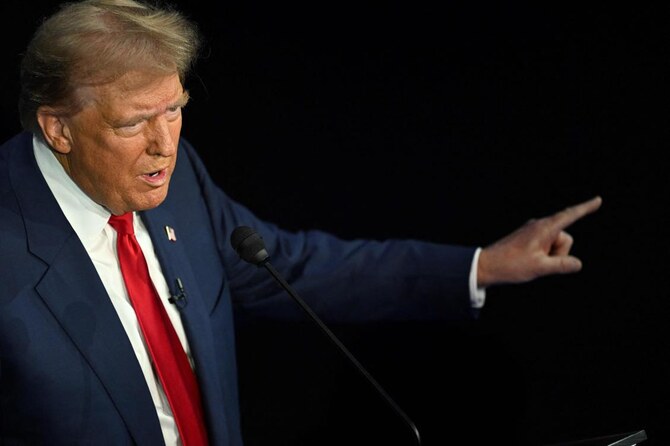PHILADELPHIA: Minutes after being hustled by Kamala Harris during their US presidential debate on Tuesday, Donald Trump appeared in front of reporters to get the last word.
As the debate drew to a close, cries of surprise went up at the entrance to the press room.
Trump had made an unexpected entrance to the “spin room,” where the candidates’ spokespeople and supporters usually hurry to distribute talking points to journalists.
Cameras and microphones in hand, dozens of reporters crowded behind thin ribbons to get as close as possible to the former president.
“What about black voters?” a reporter asked, managing to stand out from the crowd. “I love them. They love me,” the Republican billionaire declared.
Others tried to get his opinion on the 90-minute debate, during which 59-year-old Democratic candidate Harris had launched a relentless attack.
“I thought it was a great debate,” Trump said.
“I thought it was my best performance, actually, but I don’t even view it as a performance,” he added.
“Our country is in decline. We’re a nation in decline. And I thought that when we got that out, she was unable to defend it.”
Trump walked around the room, trailed by reporters, and after fielding a few questions, he finally disappeared behind black curtains.
“The fact that he showed up in the media filing center and spin room at the end, we haven’t seen that in years,” said Aaron Kall, director of debates at the University of Michigan.
“He wants to try to change the subject to something as quickly as possible.”
Both Trump and Harris will be back on the campaign trail on Wednesday, with less than two months left before the election.
They will take part in separate ceremonies to honor the victims of the September 11, 2001, attacks.
Donald Trump makes surprise ‘spin room’ visit after US presidential debate
https://arab.news/n99g3
Donald Trump makes surprise ‘spin room’ visit after US presidential debate

UK Police arrest 86 people at prison protest for Palestine Action hunger striker

- Demonstration outside Wormwood Scrubs held in support of Umer Khalid
- Khalid 1 of 5 people charged in connection with break-in at RAF base last year
LONDON: A protest outside a prison in the UK in support of a man detained for supporting the banned group Palestine Action has led to the arrest of 86 people.
London’s Metropolitan Police said a group of demonstrators breached the grounds of Wormwood Scrubs prison in the capital, refused to leave when ordered to do so, and threatened officers. They were arrested on suspicion of aggravated trespass.
The group, several of whom attempted to gain access to the prison itself, were protesting in support of Umer Khalid, who is currently on hunger strike at the facility.
Khalid is one of five people charged in relation to a break-in by Palestine Action members at an RAF base at Brize Norton last year, in which two military aircraft were damaged.
Khalid, who denies the charges, is one of several people who are on or who have taken part in hunger strikes in recent months, all of whom have been held on similar charges for over a year without their cases being brought to trial.
A spokesperson for the UK’s Ministry of Justice said: “The escalation of the protest at HMP Wormwood Scrubs is completely unacceptable. While we support the right to peacefully protest, reports of trespassing and threats being made to staff and police officers are deeply concerning.
“At no point was prison security compromised. However, where individuals’ actions cause risk or actual harm to hardworking staff, this will not be taken lightly and those responsible can expect to face consequences.
“Prisoners are being managed in line with longstanding policy. This includes regular checks by medical professionals, heart monitoring and blood tests, and support to help them eat and drink again. If deemed appropriate by healthcare teams, prisoners will be taken to hospital.”












